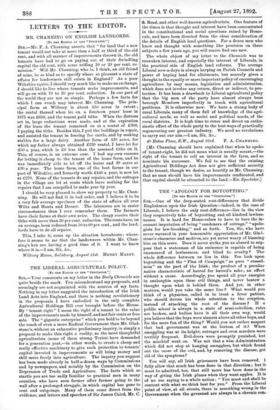THE LIBERAL AGRICULTURAL POLICY.
[To THE EDITOR OF THY "SPECTATOR"]
Sin,—Your comments on my letter in the Daily Chronicle are quite beside the mark. You misunderstand my proposals, and seemingly are not acquainted with the sources of my facts. Nothing in my letter suggested the introduction of the Irish Land Acts into England, and there is nothing revolutionary in the proposals I have embodied in the only complete Agricultural Holdings Bill ever brought before the House. By "tenant right" I mean the right of a tenant to the value of the improvements made by himself, and not fair rents or free sale. The "gigantic enterprise" which you hold to be beyond the reach of even a more Radical Government than Mr. Glad- stone's, without an exhaustive preliminary inquiry, is simply a proposal to make this right a reality, as the most thoughtful agriculturists (some of them strong Tories) have demanded for a generation past,—in other words, to create a cheap and really effective machinery to give such protection to tenants' capital invested in improvements as will bring money and skill more freely into agriculture. The inquiry you suggest has been made already in half-a-dozen ways by Commissions and by newspapers, and notably by the Commission on the Depression of Trade and Agriculture. The facts which so startle you are too sadly familiar to practical men in many counties, who have seen farmer after farmer going to the wall after a prolonged struggle, in which capital has gone to rent and outgoings. Many of them come direct from the evidence, and letters and speeches of Sir James Caird, Mr. C. S. Read, and other well-known agriculturists. One feature of the times is that thought and interest have been concentrated in the constitutional and social questions raised by Home,. rule, and have been diverted from the close consideration of the details of English land questions. For a dozen men who knew and thought with something like precision on these subjects a few years ago, you will scarce find one now.
The whole object of my letter to the Chronicle was to reawaken interest, and especially the interest of Liberals, in the practical side of English land reforms. The average Liberal now-a-days is always harping on Parish Councils and power of buying land for allotments, but scarcely gives a thought to the equally or more important policy of encouraging agriculture by easy means, legislation and administration, which does not involve any return, direct or indirect, to pro- tection. It has been a drawback to Liberal agricultural policy that the big men of the party have almost always been borough Members imperfectly in touch with agricultural problems. It is otherwise now. We have a strong body of rural Liberals, many of them full of knowledge of the agri- cultural needs, as well as social and political needs, of the rural districts. It is high time to rouse and direct an enthu- siastic effort of the whole party to the best ways of practically regenerating our greatest industry. We need no revolutions to carry out our aim.—I am, Sir, itc., 40 Eaton Place, S. W., August 23rd. F. A. CHANNINa.
[Mr. Channing should have explained that when he spoke of tenant-right, he did not mean what is usually meant,—the right of the tenant to sell an interest in the farm, and so nominate his successor. We fail to see that the existing Agricultural Holdings Act does not give sufficient security to the tenant, though we desire, as heartily as Mr. Channing, that no man should have his improvements confiscated, and. that capital should be attracted to the land.—En. Spectator.]


































 Previous page
Previous page